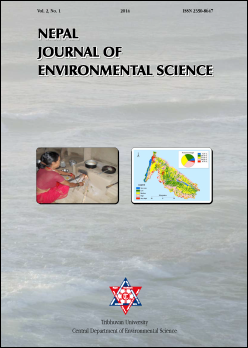Incentive scheme for improving water and watershed management in Bhaktapur, Nepal
DOI:
https://doi.org/10.3126/njes.v2i0.22742Keywords:
Land use, PES, urbanization, water scarcityAbstract
Fresh water is becoming scarce in many parts of the world. Deteriorating ecosystems, increasing population, changing lifestyles have intensified fresh water scarcity in many urban areas. Using Mahadev Khola watershed as a case, the present study investigates the reasons for decreasing fresh water availability in Bhaktapur municipality. Perceptions of water services among both upstream and downstream communities were collected; data of water supply and time series GIS data of land use change were analyzed. Growth in human population, urbanization, haphazard extraction of water in upstream and downstream areas, pollution of river, and damaged water pipes have led to reduction in fresh water availability in the municipality. Fresh water supply can be improved by implementing a carefully designed integrated water management master plan that incorporates ways to address all the causes of water scarcity. The master plan of Bhaktapur municipality could include an incentive mechanism, such as Payment for Ecosystem Services (PES), in which downstream consumers (municipality population, farmers and industries) provide financial and/or non-financial rewards to the upstream communities for protecting and managing forest ecosystem for water-conserving activities and for not applying hazardous agrochemicals in their fields.
Downloads
Downloads
Published
How to Cite
Issue
Section
License
This license enables reusers to distribute, remix, adapt, and build upon the material in any medium or format for noncommercial purposes only, and only so long as attribution is given to the creator.

